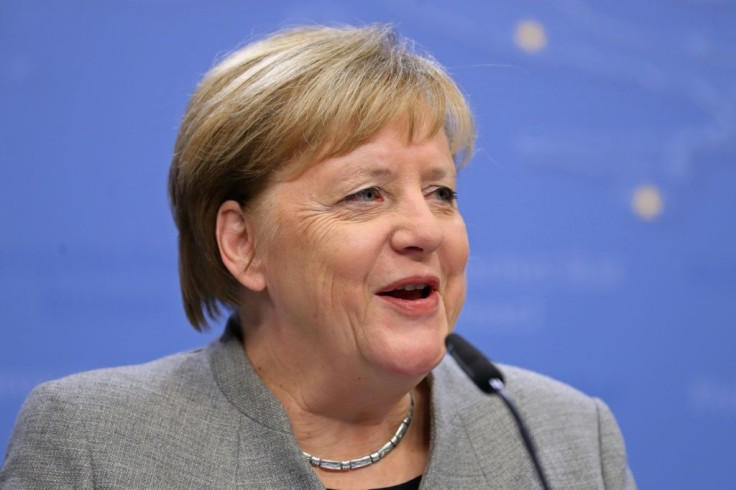Thursday's Stock Market Close: US Equities Mixed, Up From Lows, As WHO Calms China Virus Fears

KEY POINTS
- U.S. stock markets recovered from earlier losses
- ECB kep interest rates unchanged as expected
- Angela Merkel said risks of Germany slipping into recession have eased
U.S. stocks finished narrowly mixed on Thursday , recovering from earlier lows, after the World Health Organization calmed some investor fears by stating that the deadly coronavirus outbreak in China is not yet a global health emergency.
The Dow Jones Industrial Average dropped 26.45 points to 29,159.82 while the S&P 500 gained 3.75 points to 3,325.50 and the Nasdaq Composite Index rose 18.71 points to 9,402.48.
Volume on the New York Stock Exchange totaled 3.08 billion shares with 1,472 issues advancing, 198 setting new highs, and 1,462 declining, with 44 setting new lows.
Active movers were led by NIO Inc. (NIO), General Electric Co. (GE) and FuelCell Energy (FCEL)
World Health Organization said it was a “bit too early to consider this event is a public health emergency of international concern.”
The virus outbreak “has heightened fears of a global pandemic with potential implications across the economy,” said Robert Samuels, consumer analyst of the Americas at UBS. He added that U.S. companies with exposure to China “could potentially be negatively impacted from lower demand as nervous consumers stay home should the virus continue to spread.”
The outbreak, which has now killed at least 17 people and infected more than 600 others, has led to the quarantine of three large Chinese cities, including Wuhan, where the virus is believed to have originated.
Hundreds of millions of Chinese people will be traveling this week during the Spring Festival holiday.
“The bad news is that the worst has yet to come, as the number of new infections is still on the rise,” warned Larry Hu, economist at Macquarie Capital. “The lesson from SARS suggests that the turning point for sentiment will come only after the number of new infections starts falling.”
The European Central Bank voted to keep its main deposit rate at a historic low of minus-0.5%, as expected. The bank also kept its marginal lending facility at 0.25% and the main refinancing operations rate unchanged at zero percent.
In a press conference, the new ECB president Christine Lagarde said the phase one trade agreement between Beijing and Washington was a “critical development” that will have consequences around the world. “It is something that our teams are looking at very carefully to examine what the impact [will be] on a net basis for the euro area,” she said.
Lagarde also said climate change would be “an important matter” for the bank to examine.
At the World Economic Forum in Davos, Switzerland, German Chancellor Angela Merkel said the risk of Germany slipping into recession is easing. “I think we should be happy that the first phase of a trade deal between the U.S. and China has been agreed,” she said. “With each step -- an orderly British exit from the European Union, with trade deals and no trade war, less protectionism -- we are reducing the danger of a recession. At a time when we have a lot of trade conflicts, you see that global economic growth slows.”
Merkel also said that young climate activists (like Greta Thunberg) should be commended.
“The question of achieving the Paris Agreement goals could be a matter of survival for the whole continent [Europe] and that is why there is pressure to act,” Merkel said. “Time is pressing, and we must be careful as the older members of society that we treat the impatience of youth in a positive and constructive way.”
In the U.S., initial jobless claims rose by 6,000 to a seasonally adjusted 211,000 for the week ended Jan. 18, the Labor Department said on Thursday. The increase was less than expected.
The Conference Board Leading Economic Index declined 0.3% in December, following a 0.1% increase in November.
Overnight in Asia, markets dropped. China’s Shanghai Composite plunged 2.75%, while Hong Kong’s Hang Seng tumbled 1.52%, and Japan’s Nikkei-225 fell 0.98%.
In Europe markets finished lower, as Britain’s FTSE-100 dropped 0.88%, France’s CAC-40 tumbled 0.71% and Germany’s DAX fell 0.94%.
Crude oil futures dropped 2.04% at $55.58 per barrel and Brent crude edged down 0.02% at $62.03. Gold futures rose 0.3%.
The euro slipped 0.32% at $1.058 while the pound sterling fell 0.14% at $1.3123.
The yield on the 10-year Treasury fell 1.64% to 1.74% while yield on the 30-year Treasury dropped 1.62% to 2.182%.
© Copyright IBTimes 2025. All rights reserved.





















